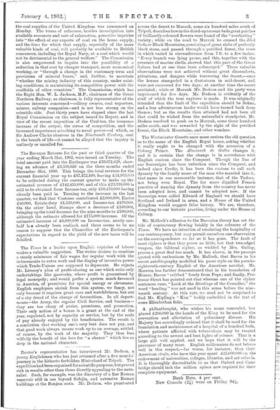The Times in a leader upon English captains of labour
makes a valuable suggestion. The writer desires to combine a steady minimum of fair wages for regular work with the inducements to extra work and the display of inventive power which Trade-Unions are supposed to deprecate. He rejects Mr. Livesey's plan of profit-sharing as one which suits only undertakings like gasworks, where profit is guaranteed by legal monopoly; and would prefer a system much favoured in America, of premiums for special energy or cleverness. English employers shrink from this system, we fancy, not only because it requires great care and watchfulness, but out of a shy dread of the charge of favouritism. In all depart- ments—the Army, the regular Civil Service, and business— they are too chary of praise, premiums, and promotion. Their only notion of a bonus is a grant at the end of the year, regulated, not by capacity or service, but by the scale of pay already enjoyed by the beneficiaries. The result is a conviction that working one's very best does not pay, and that good work always means work up to an average, settled, of course, by the work of the majority. They thus lose wilfully the benefit of the love for "a chance " which lies so deep in the national character.






































 Previous page
Previous page